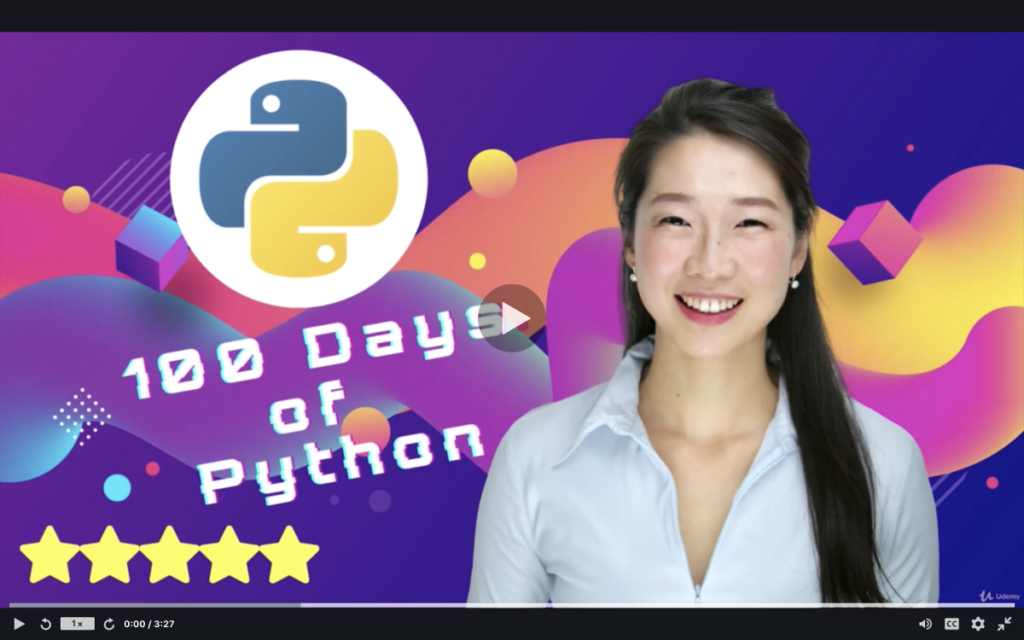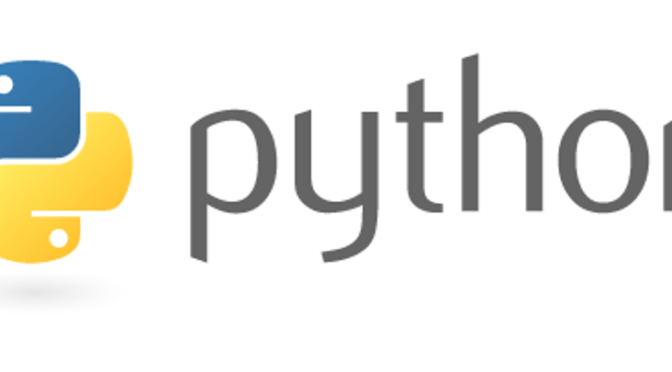If you’ve been following along for the last few months you might have seen me posting about a couple of different projects, notably the Jamuary Song-A-Day challenge to start off the year and the May You Make Your Movie video challenge I completed throughout the month og May. Now it’s July and it’s time I hit my next project: Python.
Again?
Yup, but this time I bought a course on Udemy that promises to take me through the beginning to the end of Python.

I managed to get the course for $13 USD so I figured it wouldn’t be a complete waste if I got it just in case. I downloaded after a colleague said she had completed the instructor’s other course in Flutter and found it useful to go through… though I’m not sure if she finished the entire thing… but she is now working on her own APP, so that should say something.
How will this be different from what I was trying before?
First, it gives me a definitive amount of time: 100 days. That’s three and a half months.
Second, the course instructor, Angela Yu, says each day’s task should only take about two hours.
I say “should” because I’m not newb to learning: the course lectures themselves are about an hour and a half which leaves another half an hour to do the interactive projects along the way. Add in some Google searching for “why the f is this not working?” and it might be closer to three hours a night.
That three hours is about how much time I spent on each of the other projects I’ve worked on this year, including studying Mandarin Chinese, so it fits in with an evening’s amount of work.
Now, since it’s already Saturday July 3rd, you might be wondering how things are going. Well… I’m behind already!
I only finished Day 1 on Friday night and have barely started Day 2. But herein lies the beauty of this challenge: as much as I want this thing to be done and dusted by the middle of October (to prepare for the one final big project that I want to complete after that), I’m not going to stress about completing each step exactly by midnight (Beijing time or Winnipeg time) of that day. Instead, I will listen to the lectures, go through the interactive projects on my own as much as I can, and then move on. I will not spend my time dwelling on small details, I want to get through this as quickly as possible so I can learn how Python works overall and, more importantly, so I can start splicing together code already available online to help me get things done.
The goal here is to finally complete some functional projects in Python and to see each day be crossed off the list.
If there’s one thing I’ve learned with computer programming languages, especially with Python, it’s that they are updated and they change, so it’s there no sense in crying over a detail when a Google search (usually to Stack Overflow) will often solve it. If it doesn’t, find a workaround. Don’t waste time trying to force it through.
Am I aiming to become a computer programmer? Is this some sort of career change?
Not a chance. I’m not sure I’d like the work nor would I like the idea of having to deal with a little box (the computer) and some particles and bits I can’t see (internet connection) when they don’t work. It’s not a tractor, you can’t slam a wrench against it and then expect it to keep working. If anything, programming requires such an amount of patience to not throw the computer out the window that I know not everyone can learn how to program, even if the courses for sale want you to believe that.
Patience is key in programming. I’m not very patience.
Which goes back to the reason I want to speed through this course because I’m not looking to learn all of the ins and outs of the language. I want to learn how to put together pieces of code to perform things that I might want an assistant to do instead.
It might be, half way through, that I have had enough and I’ll… keep going. I’m going to finish this course. I have enough programming books and shit that I’m not letting this one go. Like Mandarin Chinese, I’m not leaving until it’s done.
Which does make me think that three languages might be a bit much. Mandarin, Russian and Python.
To be clear, Mandarin Chinese is for practical purposes here in China. Russian is a distraction from Chinese. And Python has an end date of mid-October. By that time, unlike with the living languages, I should know whether or not I’m able to actually cobble together a program or if I should just give up already.
But it’s not just about making programs, I got thinking about ways to use Python on my Android, using it with video and sound editing, or even for websites or on my computer for some administrational stuff, like web scrapping or whatever. So, with this course, I’m hoping to build up some of these skills a little bit more rather than learn the in depth theory of why 1s and 0s get turned into C G whatever hex and then whatever after that. I don’t care, how can I make it make my life easier?
The only other thing I’m looking to learn over the next few months is another computer “language” of sorts, and that’s GIT. If you’ve not familiar with what GIT is, it’s like cloud storage but for your code. You can also see what other people are posting there and freely borrow from around the site. Likewise, if you post something there, people can help you figure out what’s wrong or suggest better ways to do something. So, if I’m going to code, it might be worth learning.
So that’s the goal with Python and the 100 Days of Code: Learn how to cobble together bits of code from places around the internet to make something I can use for myself in my own workflow.
